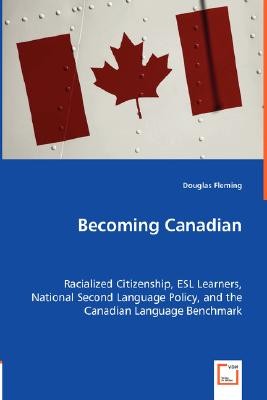
- We will send in 10–14 business days.
- Author: Douglas Fleming
- Publisher: VDM Verlag Dr. Mueller E.K.
- Year: 2008
- Pages: 244
- ISBN-10: 3639003462
- ISBN-13: 9783639003468
- Format: 15.2 x 22.9 x 1.3 cm, softcover
- Language: English
- SAVE -10% with code: EXTRA
Becoming Canadian - Racialized Citizenship, ESL Learners, National Second Language Policy, and the Canadian Language Benchmark (e-book) (used book) | bookbook.eu
Reviews
Description
Citizenship has been a deeply problematic notion since T. H. Marshall argued, in Citizenship and Social Class (1950), that even though national citizenship formally confers equal status to all members of a nation-state, inequalities of class will prevent full participation in political life. Drawing on the voices of Punjabi-speaking immigrants enrolled in an adult English as a Second Language program, this book reports a study shedding light on the concrete forces at work as they construct being Canadian. As this study establishes in some detail, while these immigrants conceive of being Canadian in terms of rights and responsibilities, the few references to citizenship within the principal national assessment and curriculum documents used in this context imply that becoming Canadian is linked to normative notions of English language fluency. Because of the almost insurmountable task for these ESL learners to achieve full fluency in this context, Canadian citizenship has been radicalised in these documents using the linguistic markers of English language fluency. Based on this research, the author argues that citizenship is understood as a hierarchy that operates both legalistically and normatively in ways that reinforce and mask inequalities based on race and language.
EXTRA 10 % discount with code: EXTRA
The promotion ends in 20d.21:59:44
The discount code is valid when purchasing from 10 €. Discounts do not stack.
- Author: Douglas Fleming
- Publisher: VDM Verlag Dr. Mueller E.K.
- Year: 2008
- Pages: 244
- ISBN-10: 3639003462
- ISBN-13: 9783639003468
- Format: 15.2 x 22.9 x 1.3 cm, softcover
- Language: English English
Citizenship has been a deeply problematic notion since T. H. Marshall argued, in Citizenship and Social Class (1950), that even though national citizenship formally confers equal status to all members of a nation-state, inequalities of class will prevent full participation in political life. Drawing on the voices of Punjabi-speaking immigrants enrolled in an adult English as a Second Language program, this book reports a study shedding light on the concrete forces at work as they construct being Canadian. As this study establishes in some detail, while these immigrants conceive of being Canadian in terms of rights and responsibilities, the few references to citizenship within the principal national assessment and curriculum documents used in this context imply that becoming Canadian is linked to normative notions of English language fluency. Because of the almost insurmountable task for these ESL learners to achieve full fluency in this context, Canadian citizenship has been radicalised in these documents using the linguistic markers of English language fluency. Based on this research, the author argues that citizenship is understood as a hierarchy that operates both legalistically and normatively in ways that reinforce and mask inequalities based on race and language.


Reviews